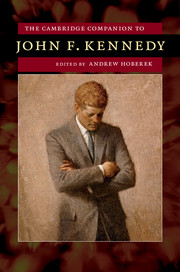Book contents
- The Cambridge Companion to John F. Kennedy
- Cambridge Companions to American Studies
- The Cambridge Companion to John F. Kennedy
- Copyright page
- Contents
- Notes on Contributors
- Book part
- Chronology of Kennedy’s Life
- Introduction: JFK and/as America
- 1 Kennedy, Boston, and Harvard
- 2 Kennedy and the Catholic Church
- 3 The Kennedy-Nixon Debates
- 4 “Investing in Persons”
- 5 JFK and the Civil Rights Movement
- 6 Kennedy, the Cold War, and the National Security State
- 7 JFK and Modernization Theory
- 8 JFK and the Global Anticolonial Movement
- 9 Kennedy and Postwar Intellectual Culture
- 10 The Camelot Presidency
- 11 The Kennedy Assassination and Postmodern Paranoia
- 12 An Eternal Flame
- 13 Free the World and Your Ass Will Follow
- 14 The Kennedy Family Romance
- 15 Kennedy and the Conservatives
- 16 The Kennedy Legacy
- Guide to Further Reading and Viewing
- Index
- References
Guide to Further Reading and Viewing
Published online by Cambridge University Press: 05 May 2015
- The Cambridge Companion to John F. Kennedy
- Cambridge Companions to American Studies
- The Cambridge Companion to John F. Kennedy
- Copyright page
- Contents
- Notes on Contributors
- Book part
- Chronology of Kennedy’s Life
- Introduction: JFK and/as America
- 1 Kennedy, Boston, and Harvard
- 2 Kennedy and the Catholic Church
- 3 The Kennedy-Nixon Debates
- 4 “Investing in Persons”
- 5 JFK and the Civil Rights Movement
- 6 Kennedy, the Cold War, and the National Security State
- 7 JFK and Modernization Theory
- 8 JFK and the Global Anticolonial Movement
- 9 Kennedy and Postwar Intellectual Culture
- 10 The Camelot Presidency
- 11 The Kennedy Assassination and Postmodern Paranoia
- 12 An Eternal Flame
- 13 Free the World and Your Ass Will Follow
- 14 The Kennedy Family Romance
- 15 Kennedy and the Conservatives
- 16 The Kennedy Legacy
- Guide to Further Reading and Viewing
- Index
- References
- Type
- Chapter
- Information
- The Cambridge Companion to John F. Kennedy , pp. 251 - 260Publisher: Cambridge University PressPrint publication year: 2015

